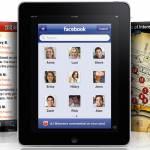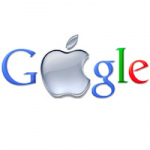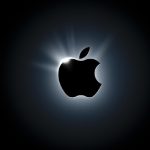Is iPad a PC? Canalys says yes, and that makes Apple No. 3 in global market share

In August and, again, in October, I asked if Apple would be the US PC market share leader if iPad counted in the numbers. It's a compelling question because of iPad's sudden sales success and analyst firms' strange classifications. For example, IDC counts iPad as a media tablet but slates running Windows as PCs. Today, Canalys released numbers counting iPad as a PC, which propels Apple to the No. 3 spot globally. Canalys' data is for fourth calendar quarter 2010.
My question for you: Should iPad or Samsung Galaxy Tab really count as PCs? Canalys counts both and other tablets. Please answer in comments.
Gartner: 185B mobile app downloads by 2014

So, you thought Apple's 10 billion application downloads was a big number? Gartner says mobile users will download 17.7 billion applications from mobile app stores this year, a 117 percent year-over-year increase. Get this: 185 billion mobile apps downloaded from app stores by 2014. You believe that? I sure as hell don't. The mobile market is yet too volatile to forecast anything, but these analysts keep trying and keep changing their predictions every couple of months. Surely the "psychic reader" down the street could do no worse and charge much less money doing so.
I nitpick because, despite mobile apps early gains, the browser may yet prove to be the better way to consume mobile applications than specialized ones downloaded from app stores. Search as a utility looks to be the killer app for mobile devices, in part because of how differently people use cell phones than, say, PCs. The person who might spend hours in front of a PC, spends seconds or minutes at a time on a smartphone (though many more interactions). Phone behavior is more contextual and personal, where utility, such as finding the nearest Starbucks or playing Angry Birds while waiting for the bus, matters more.
5 things every tablet needs to succeed

More aptly stated: 5 things every other tablet vendor but Apple needs to succeed.
Seemingly everyone who owns or can outsource a manufacturing facility is releasing a tablet this year, and many of them were announced during Consumer Electronics Show 2011. To date, about 85 tablets are in the queue. Most of them will fail. The contenders will compete with one another to lessen the numbers long before any one poses competitive threat to market leader iPad. To match, or even outsell iPad, manufacturers need at least five things, presented here in no order of importance. This list focuses strictly on logistics and purposely omits usability and design, which are separate topics for a future analysis.
IDC: Developer interest in Android nearly equals iOS

What do application developers really care about? That's the question IDC seeks to answer with a new report released today based on a survey of 2,235 application developers conducted between January 10-12. "The survey reveals how new entrants to the tablet market are changing application development priorities and how businesses large and small are accelerating their efforts to build a mobile application strategy to deal with an explosion in apps, mobile devices, operating systems, and capabilities," according to the report.
The clincher: "Google has nearly caught up to Apple in smartphone popularity and is closing the gap in tablets." Read that sentence a second time and let the implications sink in and think about what it ultimately means for all the seemingly endless rah rahs for Apple's iOS.
Why is iPad successful?

It's the question asked by a Betanews reader last week. While there is no single answer, two reasons stand out: iPod and iPhone and the ecosystem supporting them. Apple launched its tablet with huge manufacturing, distribution and third-party support, something it didn't have with iPod and less of with iPhone. Purely from that perspective, and discounting design or technical merits, Research in Motion and Samsung are strategically in best competitive ecosystem positions to release viable iPad competitors.
Some Apple fans will disagree, arguing that iPad's size, design and user experience make it far superior to other tablets. I won't debate those points here but only observe they would be meaningless without the supporting ecosystem created by iPod and iPhone. Apple didn't launch iPad into a vacuum but with lush sales and distribution environment.
Gartner: Most CIOs have their heads in the clouds

What do CIOs care most about? Cloud computing, says Gartner. They see the cloud as opportunity to freeing up resources that will be reinvested in future growth. Gartner released the findings of its 2011 CIO Agenda survey on Friday.
According to Gartner, the typical IT organization invests two-thirds of its budget to daily operations. Moving to the cloud will fee up between 35 percent to a whopping 50 percent of operational and infrastructure resources for reallocation elsewhere.
Flash is no longer default option for YouTube embeds

I don't know how I missed this one: Google has taken iframe embedding out of beta and quietly made it the default choice. I noticed yesterday, when looking to embed a video here at Betanews. The default had been Adobe Flash with iframe embedding optional and labeled beta; where iframe was placed in the embed options there now is "use old embed code," meaning Flash. I've been embedding with the iframe code for months so Betanews readers using iPads or smartphones could watch embedded YouTube videos. Based on forum chatter, Google made the change as recently as four days ago.
Technically, the player isn't Flash-free. It's more like Flash is no longer required. Videos can stream in Flash or HTML5 video depending on the player detected. For reasons that don't make much sense from a consumer experience perspective, YouTube videos using the new embed code won't play on Safari without Flash installed (presumably other browsers, but I haven't yet tested). YouTube detects the browser and presents notice that Flash is necessary to play the video. It's not. YouTube is blocking HTML5 streamed content. Changing the browser's identification to "Mobile Safari -- iPad" solves the problem. But why is that necessary?
Refurbished PCs: When used is better than new

Whenever possible, I buy refurbished PCs rather than new ones-- and it's what I recommend to all my friends. Unfortunately, the word "refurbished" is loaded with bad connotations -- used, damaged, unreliable -- that can make items so labeled unattractive to many buyers. But it's my experience that at least with personal computers, refurbished often means better than new, because retailers or manufacturers are selling something at a loss they never want to see again. Returned once is one time too many. Twice or thrice is simply unacceptable.
I got my first tip off about the benefits of refurbished in the late 1990s when visiting a Sony repair store then located in Beltsville, Md. I observed a number of PCs and asked about them. One of the clerks explained that the shop was one of just a couple clearinghouses refurbishing Sony PCs. I expressed my disbelief in refurbished as being any good. But he explained that Sony didn't want to ever see the PCs again. His job was to make sure the refurbished PCs left in perfect working order.
Is 7-inches the better size for a media tablet?

It's the question I've been asking since selling my iPad the week before Christmas. I simply found the tablet to be too large to regularly carry about. I wasn't using it. I ask you to answer the question in comments or by email -- to joewilcox at gmail dot com. I'm particularly interested in hearing from people who have used, say, iPad and Samsung Galaxy Tab.
Late Friday, Kevin Tofel turned up the volume on the topic with GigaOM/jkOntheRun post "Why I Dumped the iPad (Hint: Size Matters)." While praising iPad's many benefits, Tofel reached the same place as I did. "The problem is that I simply don't use it any more," he writes. "Actually, let me rephrase that: I stopped using the iPad about a month ago, after I bought a 7-inch Samsung Galaxy Tab running Google Android."
What do Apple and Google CEO changes reveal about their corporate cultures?

This week Apple and Google disclosed holiday quarter earnings and made unexpected management changes. The executive shuffles and how they were announced is opportunity to compare and contrast the management styles and corporate cultures of these two hugely successful technology companies.
The basic similarities are interesting: Both companies announced better-than-expected fourth calendar quarter earnings. Both companies made CEO announcements affecting who runs day-to-day operations. Both companies assumed some risk that Wall Street would negatively respond to management changes. But they chose different approaches to announcing these changes.
Google sets its top 2011 priorities right -- on mobile

In a short piece, posted in Harvard Business Review, Google CEO Eric Schmidt lays out three priorities for 2011. I'm not exactly sure when this thing was posted. I saw reference to it today on ReadWriteWeb. Google's three priorities are all about mobile, as they should be.
"First, we must focus on developing the underlying fast networks (generally called LTE)," Schmidt writes. "Second, we must attend to the development of mobile money," he continues. "Third, we want to increase the availability of inexpensive smartphones in the poorest parts of the world."
Gartner: 10 OEMs generated $104.3B semiconductor revenue in 2010

Ten companies accounted for a third of semiconductor demand in 2010, according to data released today by Gartner. HP, Samsung and Apple topped the list. Gartner measures semiconductors on what it calls a design total available market, or TAM, basis. The leaders accounted for $104.3 billion revenue, which rose 33.7 percent year or year, or $26.3 billion.
"Semiconductor device vendors should closely monitor the changing competition structure of the target market," Masatsune Yamaji, Gartner senior research analyst, said in a statement "Do not just listen to the requirements of the current market leaders. Have a dedicated sales team, with business development sales metrics, looking for new market entrants who will be the next-generation market leaders."
Career Factor: Microsoft's online reality show where IT meets the social web

Microsoft is using social media as foundation for a web-based reality show following the career quests of nine participants. You can follow their exploits online (e.g., at work when the boss isn't looking), no television required. The Career Factor website went live last week, but the nine participants only started updating their quests yesterday.
The website describes itself as an "online reality show based on the experiences of nine IT personalities. Each of our candidates have set a professional goal for themselves, and have invited you to follow their every step along the way." Each participant has a personal page where "you can explore their backgrounds, learn from their experiences and share your findings. You'll find videos, links to learning resources, tips and updates via their blog and various social media outlets."
How many LivingSocial users can Amazon buy for $10?

Deal site LivingSocial has got a helluva bargain today: A $20 Amazon gift card for 10 bucks. Who could resist that? I could. Should you?
LivingSocial specializes in half-price deals, typically specific to larger cities -- assuming you live there. I went to the site for the first time early this afternoon. By Internet magic, most likely IP address, LivingSocial correctly detected my city as San Diego. I clicked through to see the big deal, the aforementioned half-price Amazon gift card.
Five lessons you should learn from Apple's $26.7B record quarter

Apple's record fiscal 2011 first quarter will be the Starbuck's coffee talk of Wall Street today. Apple beat analysts' revenue consensus by about $2.3 billion. Behind the numbers there are lessons to learn about the company and economic opportunities that competitors, non-competitors and partners should be aware.
I've chosen five things, which are presented in no order of importance. As usual, I expect to get whacked aside the head by Apple worshippers who balk at the slightest criticism. For some people, there's only one side to every argument.
Joe's Bio
Joe Wilcox is BetaNews executive editor. His motto: Change the rules. Joe is a former CNET News staff writer, JupiterResearch senior analyst, and Ziff Davis Enterprise Microsoft Watch editor.
Ethics Statement© 1998-2025 BetaNews, Inc. All Rights Reserved. About Us - Privacy Policy - Cookie Policy - Sitemap.
